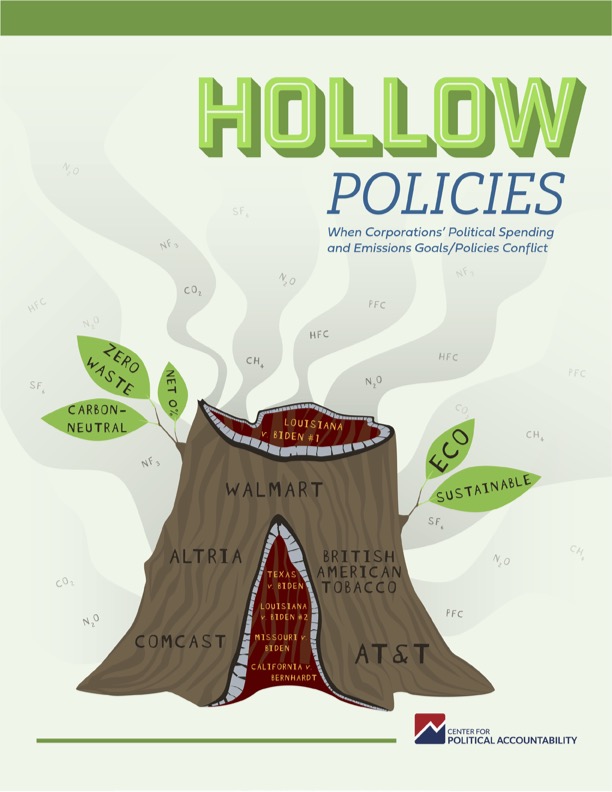Seventy-Five Leading Public Companies Undercut Their Climate Change Commitments Through Conflicted Political Spending, CPA Report Discloses
At a time when climate change is one of the toughest challenges confronting U.S. corporations, many companies tout their commitment to environmental stewardship. But they invite public scrutiny or attack when money they spend on politics ends up supporting conflicted outcomes.
A report released today by the Center for Political Accountability finds that 75 leading companies have undercut their commitment to reducing greenhouse gas emissions, through their conflicted political spending.
These corporations’ treasury dollars helped elect state attorneys general, through direct or indirect political contributions, and the attorneys general in turn have gone to court to prevent the reduction of emissions in nine separate court cases, says the report, titled Hollow Policies.
The corporate political contributions came over the last three election cycles – 2016, 2018 and 2020. In this period, 75 public corporations directly contributed more than $770,000 directly to 16 attorneys general candidates; and 58 public corporations, which donated $100,00 or more per election cycle to a group called the Republican Attorneys General Association, poured more than $16.5 million into RAGA.
RAGA played a key role in funding attorneys general races. Over the three election cycles, 22 attorneys general candidates received more than a combined $5.5 million from public companies directly and from RAGA, with $4.7 million coming from the attorneys general group.
All of the companies had policies or made pledges to reduce greenhouse gas emissions. They included Altria, AT&T, Comcast, Walmart, Citigroup, Microsoft, ExxonMobil, Home Depot, General Motors, Amazon, Uber and British American Tobacco.
Among the leading recipients of the political donations were Attorneys General Alan Wilson of South Carolina, current chairman of RAGA; Ken Paxton of Texas, a former RAGA chairman; and Steve Marshall of Alabama, recently elected chair of RAGA’s executive committee, according to the group’s website.
RAGA attracted attention because of the role of one of its entities in promoting the rally last year that morphed into the January 6th attack on the U.S. Capitol.
“Many public corporations recognize the threat of climate change and have implemented goals or policies to reduce their own emission footprints,” the Hollow Policies report said. “However, these same corporations’ treasury dollars have helped elect state attorneys general who have acted to prevent the reduction of emissions in nine separate cases. Their actions potentially or effectively undermine these donor corporations’ emissions goals and policies.”
Kevin Brennan, Co-Head of the Investment Engine and Director of Investment Systems at Bridgewater Associates, spotlighted the risk the conflicted spending poses to companies and investors in his foreword. “While these cases are just that, ‘cases,’… the risks of unintended consequences this dissonance poses to corporations and investors are significant and need to be addressed,” he wrote.
“This report should serve as an important reminder to corporations to reassess their political contribution policies, including expanded transparency, to ensure alignment with their public and internally defined goals,” he wrote. Brennan belongs to CPA’s board of directors.
CPA advocates for companies to reduce or mitigate the risks of their political spending in a volatile environment through transparency and accountability measures, including steps to align their political spending with core company values and statements. Earlier CPA reports include “Collision Course,” “Conflicted Consequences” and “Corporate Enablers.”

